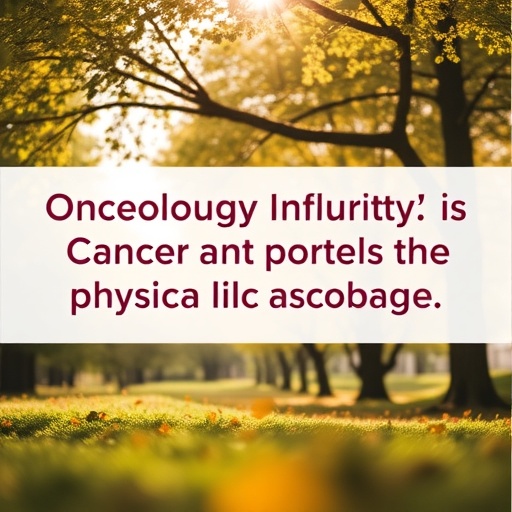In a groundbreaking study published in BMC Nursing, researchers have uncovered vital insights into the dynamics of oncology nursing and physical activity discussions among cancer patients, particularly older adults. The research conducted by Sattar, Nadler, Trinh, and their team sheds light on the significant knowledge gaps that exist within the oncology nursing community regarding the benefits of physical activity in cancer care. With the aging population increasingly affected by cancer, this research could have profound implications for patient outcomes and quality of life.
Cancer remains a leading cause of morbidity and mortality globally, forcing healthcare providers, especially oncology nurses, to rethink their approach to holistic patient care. The study emphasizes an area that is often overlooked: the promotion of physical activity. Despite the well-documented advantages of exercise in mitigating some cancer treatment side effects, many oncology nurses are inadequately equipped to discuss these benefits with their patients. This lack of communication can limit the positive impact physical activity can have on recovery and overall well-being.
During the research, Sattar and colleagues utilized a mixed-methods approach, combining quantitative surveys with qualitative interviews to assess oncology nurses’ knowledge, perceptions, and perceived barriers when discussing physical activity with patients. The findings revealed a staggering disparity between the known benefits of physical activity and the current practices among oncology nurses. Many expressed uncertainty regarding how to initiate conversations about exercise, often feeling unqualified to guide their patients on this vital aspect of care.
One of the key factors that emerged from the study was the misconception that physical activity might be counterproductive during cancer treatment. Many oncology nurses held the belief that patients in the midst of treatment should primarily focus on rest and recovery rather than engaging in exercise. However, research indicates that gentle physical activity can reduce fatigue, enhance mood, and even improve treatment outcomes. This disconnect highlights the urgent need for targeted education and training for nurses to update and align their knowledge with contemporary scientific evidence.
Additionally, the study unveiled various perceived barriers to initiating discussions about physical activity. Time constraints were repeatedly cited as a significant deterrent, with many nurses overwhelmed by their existing responsibilities. They felt a lack of systematic protocols within their institutions on addressing physical activity in patient care, which could contribute to the reluctance to engage patients in these vital conversations.
Interestingly, the findings also illustrated that oncology nurses who had personal experiences with physical activity—either through personal practice or observing family members with cancer—were more inclined to advocate for its inclusion in patient care discussions. This personal connection acted as a catalyst, empowering them to bridge the knowledge gap and instigate conversations that could ultimately benefit their patients.
In light of these discoveries, the research team emphasizes the critical importance of comprehensive training that encompasses the benefits of physical activity, appropriate exercise prescriptions, and strategies for effectively communicating these concepts to patients. The integration of physical activity into the care models for cancer patients, particularly among older adults, could lead to enhanced survival rates, reduced treatment side effects, and improved overall quality of life.
Moreover, the authors call for further research to explore the effectiveness of educational interventions aimed at enhancing oncology nurses’ competencies in discussing physical activity. By establishing best practices and standardized guidelines, healthcare institutions can foster an environment where physical activity discussions are not only welcomed but actively encouraged within the oncology clinic setting.
The implications of this research are profound. As oncologists and healthcare providers work tirelessly to improve cancer treatments, it is equally critical to invest in strategies that encourage patients to engage in healthier lifestyles, notably through physical activity. Addressing this area could revolutionize the traditional treatment frameworks, ensuring that cancer care is not solely focused on combating the disease itself but is also devoted to preserving and enhancing the quality of life for patients during and after treatment.
In conclusion, the insights garnered from this study are a clarion call for a transformation in how oncology nurses approach patient care. By confronting knowledge gaps and perceived barriers related to discussions about physical activity, the oncology nursing community can take strides toward more integrated, comprehensive cancer care. Creating a supportive structure for oncology nurses to embrace and promote physical activity will ultimately empower patients and may lead to more favorable outcomes in their cancer journey.
The research contributes significantly to the understanding of oncology nursing practice and highlights an essential area for future development. As such, it advocates for ongoing dialogue, training, and resource allocation to ensure that physical activity becomes a standard component of oncology care. The ramifications for patients, healthcare providers, and the broader oncology field could be monumental, fostering a more holistic approach to cancer treatment.
Subject of Research: Oncology nurses’ knowledge, perceptions, and perceived barriers regarding physical activity discussions with cancer patients.
Article Title: Oncology nurses’ knowledge, perceptions, and perceived barriers related to discussing physical activity with patients with cancer, including older adults.
Article References:
Sattar, S., Nadler, M.B., Trinh, L. et al. Oncology nurses’ knowledge, perceptions, and perceived barriers related to discussing physical activity with patients with cancer, including older adults. BMC Nurs (2025). https://doi.org/10.1186/s12912-025-04090-w
Image Credits: AI Generated
DOI:
Keywords: Oncology nursing, physical activity, cancer care, patient outcomes, knowledge gaps.




